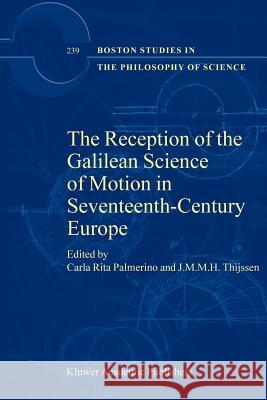The Reception of the Galilean Science of Motion in Seventeenth-Century Europe » książka
The Reception of the Galilean Science of Motion in Seventeenth-Century Europe
ISBN-13: 9789048166589 / Angielski / Miękka / 2010 / 288 str.
The Reception of the Galilean Science of Motion in Seventeenth-Century Europe
ISBN-13: 9789048166589 / Angielski / Miękka / 2010 / 288 str.
(netto: 384,26 VAT: 5%)
Najniższa cena z 30 dni: 385,52 zł
ok. 22 dni roboczych
Bez gwarancji dostawy przed świętami
Darmowa dostawa!
This book collects contributions by some of the leading scholars working on seventeenth-century mechanics and the mechanical philosophy. Together, the articles provide a broad and accurate picture of the fortune of Galileo's theory of motion in Europe and of the various physical, mathematical, and ontological arguments that were used in favour and against it. Were Galileo's contemporaries really aware of what Westfall has described as "the incompatibility between the demands of mathematical mechanics and the needs of mechanical philosophy"? To what extent did Galileo's silence concerning the cause of free fall impede the acceptance of his theory of motion? Which methods were used, before the invention of the infinitesimal calculus, to check the validity of Galileo's laws of free fall and of parabolic motion? And what sort of experiments were invoked in favour or against these laws? These and related questions are addressed in this volume.











